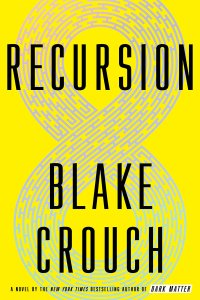Paul Di Filippo Reviews Recursion by Blake Crouch
 Recursion, Blake Crouch (Crown 978-1-5247-5978-0, $27, 336pp, hardcover) June 2019
Recursion, Blake Crouch (Crown 978-1-5247-5978-0, $27, 336pp, hardcover) June 2019
It’s easy to recognize a certain kind of technothriller bestseller, even one that’s skillfully done. The characters are not necessarily flat, but, for easy readerly absorption, they spring from readily identifiable societal niches: cop, businessman, housewife, general, terrorist. The language is pared down and highly cinematic, with lots of scenes plainly intended for the big screen. Not much introspection or interiorization. There’s a veneer of topicality. The MacGuffin is usually a single, easily graspable concept, perhaps a brand-new invention or threat. The plotting is rapid-fire, in a traditional Hollywood pattern of reveals and reversals, and comes in bite-sized segments. If I were to name Michael Crichton as the purveyor of such books, I think veteran readers would instantly nod their heads. Such novels are often broad but shallow, entertaining but forgettable.
For the first few chapters I was confidently stuffing Blake Crouch’s new book, Recursion, into this pigeonhole, with some justification. Then the narrative began to go seductively off the rails, into unpredictable territory of pure science-fiction gonzo-ness, exploding and exfoliating jaggedly. In the end, Crouch achieves a tale that can stand shoulder to shoulder with Tom Sweterlitsch’s The Gone World, Ursula K. Le Guin’s The Lathe of Heaven, Claire North’s The First Fifteen Lives of Harry August, and Elan Mastai’s All Our Wrong Todays. It might be somewhat slick, it might be eminently filmable, but it has heft and gravitas beyond the unambitious technothriller category.
We are going to experience events through the minds of two protagonists. At first they are operating on separate tracks. But these lifelines will converge, break apart, reconverge, and then splinter along a dozen dimensions, before finally achieving a satisfying climactic unity.
First up is Barry Sutton, middle-aged, embittered, melancholy NYC cop. Devastated by the death of his teen daughter and his subsequent divorce, he coasts through his job with the aid of too much alcohol. But then a strange incident motivates him to new exertions. He attempts to stop a would-be suicide, a woman suffering from False Memory Syndrome. This is a new phenomenon whose sufferers have access to memories of an entire alternate lifetime differing from their manifestly “actual” lifetime. Often this schizophrenia of memories leads to derangement and despair. Barry fails to help this woman, but her plight intrigues him, especially since he wishes for a do-over of his own history. He begins to investigate her case, and it leads him to the lip of a dangerous rabbit hole.
Interspersed with this track, we are back a decade or so in the past, following the doings of scientist Helena Smith. Her neurological brain studies revolve around memory. She wants to be able to record and implant memories, mostly to help Alzheimer patients such as her Mom. Record the memories of dementia victims before they disintegrate, then maybe re-implant them later. She is approached by billionaire Marcus Slade — an Elon Musk figure if there ever was one (he’s becoming the go-to ambiguous villain of our era) — who offers to fund her without limit. She accepts the offer, but after much hard work finds out that Slade has subtly, then forcibly and overtly, pushed her research in a certain direction. What she achieves is nothing less than time travel, but of a most peculiar sort, embodied in a device dubbed the “memory chair.” It involves projecting just the consciousness of the traveler back along his or her personal timeline and into their younger body/mind gestalt, effectively wiping out the earlier version.
Oh, yes, the traveler has to die in the present to achieve the jump, lending the technology a great, Gothic, Poe-esque ambiance, like some creepy lateral spinoff of “The Facts in the Case of M. Valdemar”. This conceit in slightly different form also powers James Tiptree’s “Backward, Turn Backward” and is used there with similarly horrific consequences.
In any case, this psychic time travel is what’s provoking False Memory Syndrome. Actions by a host of time travelers — Slade has commercialized the tech without Helena’s knowledge or approval — is generating what amount to counterfactual histories, superimposed on the originating timelines.
By now, Barry has tumbled to all this, and he and Helena meet to try to take Marcus down. They succeed after a fashion (with Barry being sidelined for a while from further action). But soon thereafter DARPA has the tech, and the US government begins using it for political purposes. From here, waves of instability begin to radiate, with the multiverse gyrating. Helena and Barry must make a supreme sacrifice of love and happiness to try re-stabilize the continuum in a Groundhog Day maneuver. Six tries, involving repeated apocalypses, fail. And the seventh? You must read to find out.
Crouch does a whole passel of things quite admirably here. He invests his two main characters with plenty of easily understandable motivations and traits which he then evolves through repeated “test to destruction” moments. There’s lots of wrenching emotional moments on hand. To accompany this he conjures up an eminently rigorous and logical methodology and science for his strange time travel gadget. Everything that happens flows directly from the explicit parameters of the “memory chair.” And yet you will not predict anything. In short, the fusion of human verities — albeit contorted into unprecedented shapes — and a fruitful novum sternly parsed leads to quintessential SF. Crouch’s skills in laying down tense and vivid action scenes is essential here as well.
The book also resonates with a couple of other precedents. Through unwise and exorbitant use of the memory chair, Slade becomes a figure like Marvel’s Kang the Conqueror, deranged, omnipotent, multiplex. And the depiction of how a “simple” technology can have insane knock-on effects recalls the similar lesson that Damon Knight painted in his time-viewer story “I See You,” and which Clarke and Baxter later developed in The Light of Other Days.
When the timeline convulses, everyone gets their memories updated on the run. When it happens once to Barry, he thinks, “Remembering a lifetime in a span of sixty seconds is a hell of a thing.”
Crouch’s book packs the same punch!
 While you are here, please take a moment to support Locus with a one-time or recurring donation. We rely on reader donations to keep the magazine and site going, and would like to keep the site paywall free, but WE NEED YOUR FINANCIAL SUPPORT to continue quality coverage of the science fiction and fantasy field.
While you are here, please take a moment to support Locus with a one-time or recurring donation. We rely on reader donations to keep the magazine and site going, and would like to keep the site paywall free, but WE NEED YOUR FINANCIAL SUPPORT to continue quality coverage of the science fiction and fantasy field.








You have got to be kidding.
This is novel as movie script. It’s junk as a novel. The writing’s a joke.